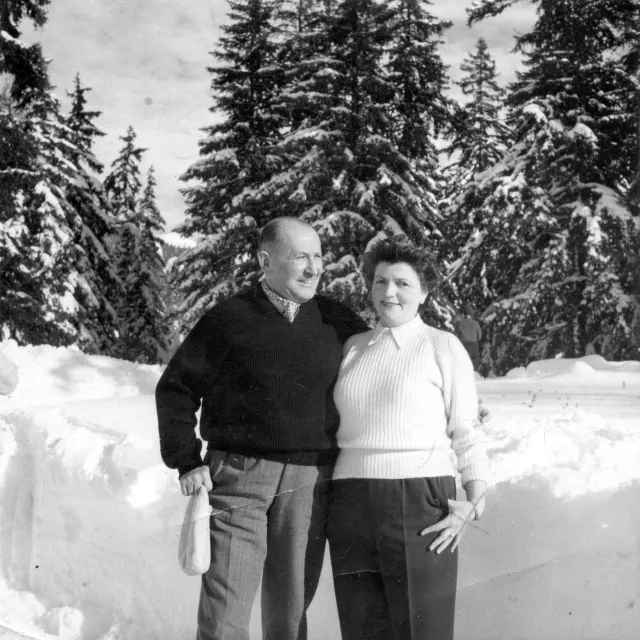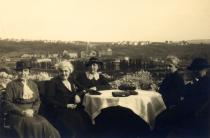This is a photograph of Uncle Pepa (Josef Bruml), my mother's brother, and his wife Eli, nee Segerova; it was taken in December of 1954. Because they left Czechoslovakia still before 1948, they used to get permission and could visit here during Communist times as well.
Besides my mother, my grandmother and grandfather also had three sons, of whom Benedikt and Jan were twins born in 1896 or 1897. Josef, who they called Pepa, was a year older than my mother, so born in 1893.
Uncle Pepa and his family lived in Teplice, where he took over Grandpa's clothing store. During the Great Depression they were faring very badly, so they moved to Liberec, where his father-in-law, Mr. Seger, a Jew originally from Kolin, lived. Pepa's wife was named Eli. They had two children, a son born in 1926, and a daughter, Mariana. We often spent time with Pepa's family. I liked them very much; we had a lot in common as far as personality goes, too. Pepa used to go to synagogue for Yom Kippur and sometimes during the Sabbath, too. I think that his religiousness was relatively lukewarm. They definitely didn't have a kosher household.
Pepa also fought in World War I, however he didn't enlist voluntarily. He was taken as a prisoner of war in Siberia. He was stuck there for a relatively long time even after the war, because he was in prison in Siberia, and in there they didn't at first know that the war had ended, and even then their release took a long time. He definitely didn't get home until after I was born, so not until after 1921. The Russians had begun to do business with the prisoners, they brought them food and in exchange they gave them their old uniforms and various army things. My uncle had always liked to cook, and he then worked there as a cook, so at least he didn't go hungry. Always when they released someone, the others would give him letters for their families back home, who thus got to know that they were alive.
One sister-in-law of Pepa's got married to someone in England still before the war, and thanks to her help, Pepa and his family moved there at the last moment, in 1939, so they all survived. At first they lived with his sister-in-law and her husband, who was a Romanian Jew by origin and went to England at the beginning of the 1930s. He made a living selling goods to department stores. He gradually entrusted my uncle with one branch of his wholesale business.































